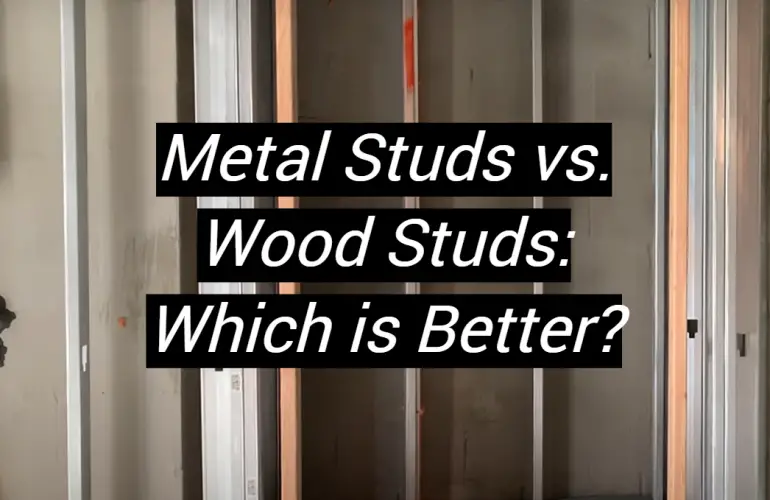Metal studs vs. wood studs: Which is better? This is a question that many people have, and the answer is not always clear. In this article, we will compare metal racks and wooden racks to help you decide which option is best for you. We will discuss the pros and cons of each material, as well as some common questions that people have about metal racks vs. wood racks. By the end of this article, you should have a good idea of which type of rack is right for your needs!
Steel Stud Basics
Steel studs are the most popular type of framing material for both commercial and residential construction.
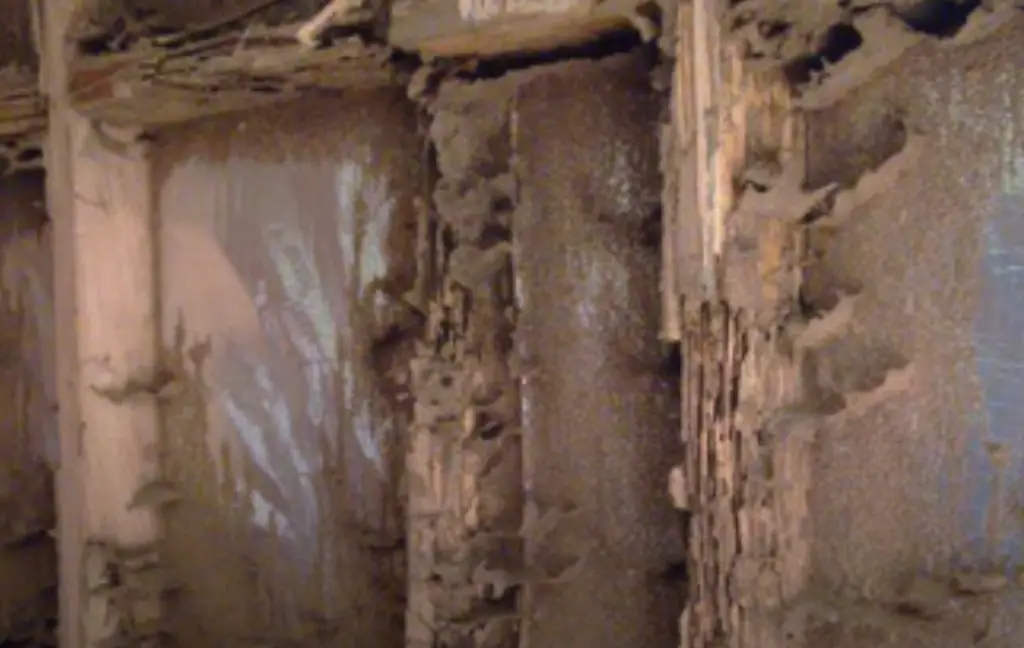
They are strong, durable, and easy to work with. Steel studs are also fire resistant and termite proof, which makes them a great choice for many homes and businesses. However, steel studs can be more expensive than wood studs, and they are not as easy to find in some hardware stores.[1]
Standard Sizes of Steel Studs
There are three standard sizes of steel studs used in construction: 6 inch, 8 inch, and 12 inch.
The thickness of the steel stud also varies depending on its purpose. 20 gauge steel is the thinnest steel allowed for load-bearing walls, while 25 gauge is the thickest.
Pros of Steel Studs
Predictable
When it comes to construction, there are a lot of variables that can affect the outcome of your project. The last thing you want is for your walls to be made out of material that is unpredictable. Wood studs can warp and twist over time, which can cause your walls to become uneven. Steel studs will always remain straight and true, giving you predictable results.
Durable
Another big advantage of steel studs is that they are much more durable than wood. Wood studs can be damaged by moisture, insects, and fire. Steel studs are not affected by any of these things, making them the clear choice for a durable wall system.
Cost-effective
In the long run, steel studs are also more cost-effective than wood. Wood studs can warp and twist over time, which means they will need to be replaced more often. Steel studs will last a lifetime, so you won’t have to worry about replacing them.
Lightweight
Steel studs are also much lighter than wood, making them easier to work with. This is especially important if you are working on a large project. The last thing you want is to be weighed down by heavy lumber. Steel studs will make your job easier and help you get the job done faster.[1]
Good for problem areas
If you have an area of your home that is prone to moisture or insects, steel studs are the way to go.
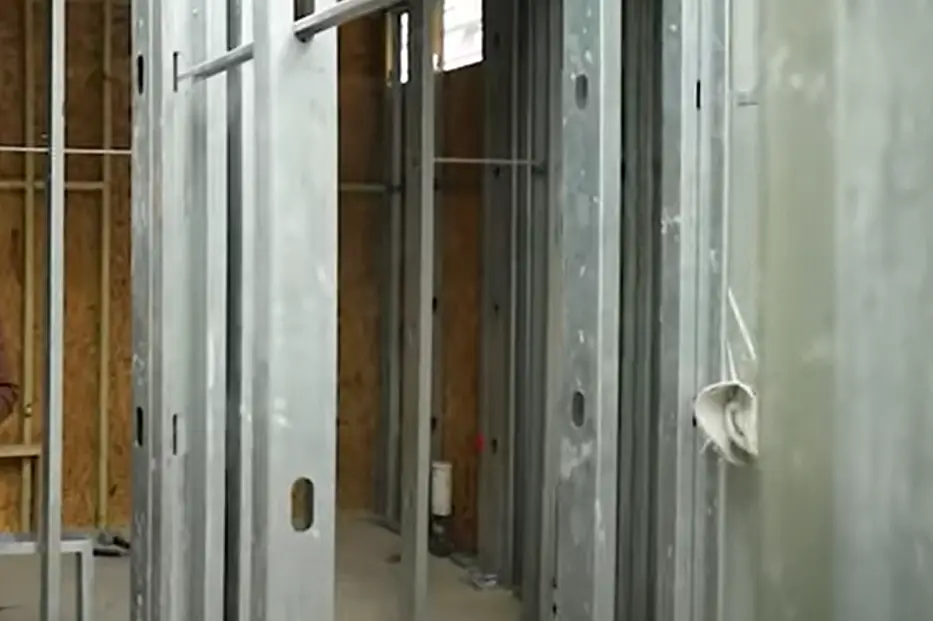
Wood studs will be damaged by these things, but steel studs will not. This makes them the perfect choice for areas that are difficult to keep dry or free of pests.[1]
Cons of Steel Studs
Difficult to cut
If you’re planning on doing any renovations yourself, you’ll quickly find that steel studs are much more difficult to cut than wood. Not only is it more challenging to get a clean cut, but it’s also more dangerous as the sharp edges can easily cause injury.
Limited availability
While steel studs are becoming more popular, they’re still not as widely available as wood. This can make them more expensive and difficult to find, especially if you’re looking for a specific size or type.
Limited creativity
When it comes to creativity, steel studs are somewhat limited. While you can still create interesting and unique designs, you won’t have as much freedom as you would with wood. This is because steel studs are usually only available in a few standard sizes and shapes.
Drywall installation is tricky
Another potential downside of steel studs is that they can make drywall installation tricky. The nature of steel means that it’s difficult to get a tight fit, which can result in gaps and unevenness. This is something to keep in mind if you’re planning on doing any DIY work.
Risk of rust
Finally, one of the biggest disadvantages of steel studs is the risk of rust. If they’re not properly sealed and protected, they can quickly develop rust spots that can be difficult to remove. This is something to keep in mind if you live in an area with high humidity or frequent rainfall.
Wooden Studs: What’s The Deal?
Wooden studs have been used for centuries in construction and are still the most popular choice among builders today. They are strong, durable, and easy to work with. However, there are some drawbacks to using wood studs that you should be aware of before you make your final decision.
One of the biggest drawbacks of wooden studs is that they are susceptible to rot and insect damage.
Insects can also infest wood studs and cause serious damage. If you live in an area with a high risk of termites or other insects, wooden studs may not be the best choice for you.Another downside of wooden studs is that they are not as fire resistant as metal studs. If a fire were to break out in your home, wood studs would be more likely to catch fire and spread the flames than metal studs.
Are Wooden Studs Traditional?
Wooden studs have been the traditional choice for framing construction projects for many years. But that doesn’t necessarily mean they’re always the best option.[2]
Are Wooden Studs Hard to Acquire?
Wooden studs aren’t difficult to acquire, but they are more expensive than metal studs.
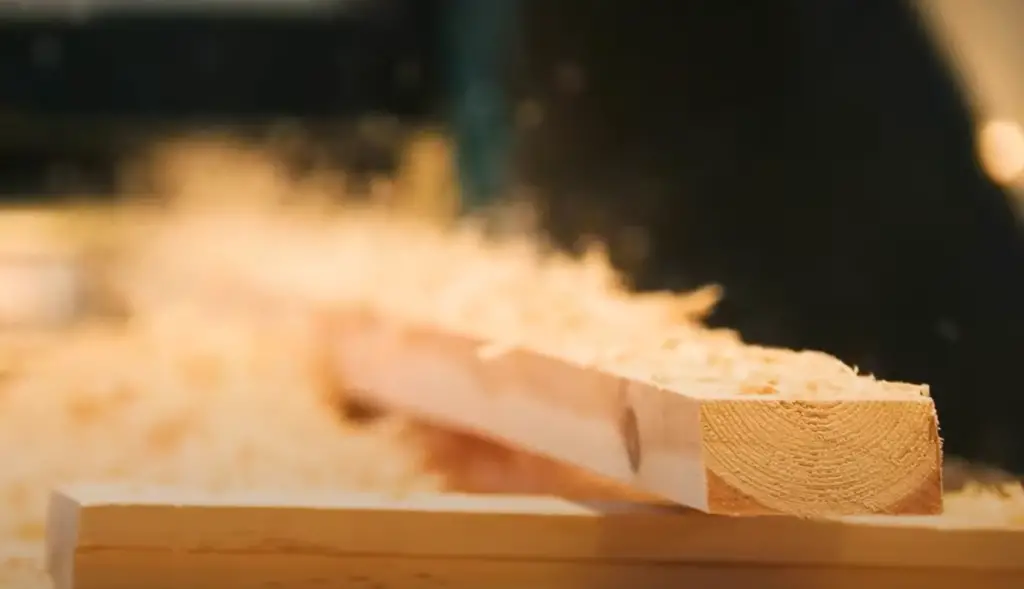
The price of the wood will vary depending on the type of wood and the quality. You can usually find good quality wood at a lumberyard or home improvement store.[2]
How Many Types of Wooden Studs Are There?
There are three types of wood studs: solid, engineered and laminated veneer lumber (LVL). Solid wood studs are the most common type used in construction. Engineered wood studs are made with a laminate of veneers glued together under high pressure to create a strong, dimensionally stable product. LVLs are composed of thin layers of wood that are laminated together with an adhesive.[2]
What Kind of Screws Should Be Used For Wooden Studs?
There are many different types of screws available on the market, but not all of them are created equal. When it comes to screws for wooden studs, you need to make sure that you’re using a high-quality screw that is designed specifically for wood. This will ensure that your screws will stay in place and won’t strip out the wood over time.
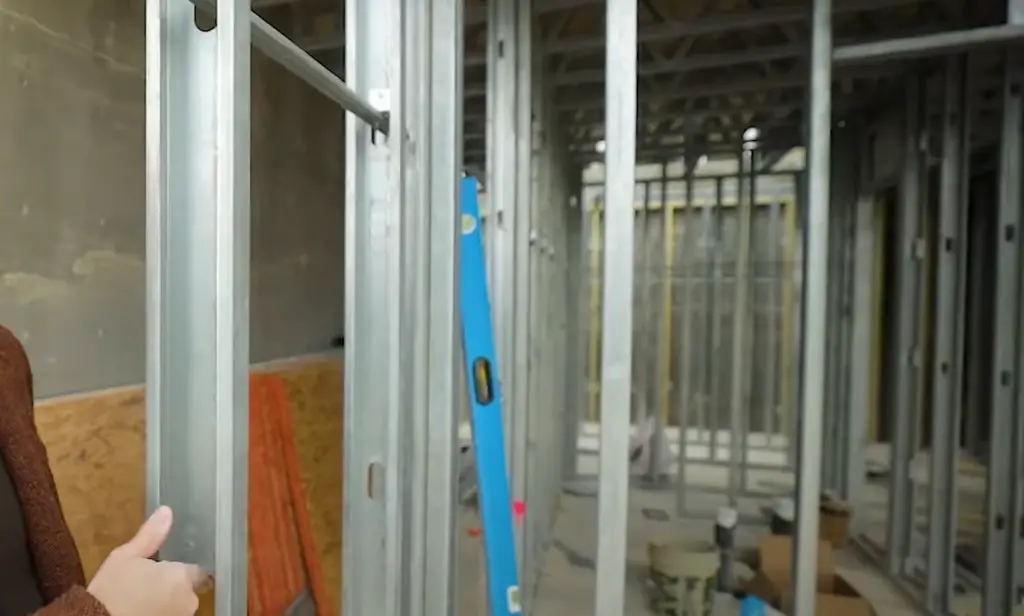
Some of the best screws for wooden studs include:
- Drywall screws: these are specially designed for attaching drywall to wood studs. They have a sharp point that penetrates easily into the wood, and they’re also coated with a special material that helps to prevent rusting.
- Deck screws: these are another great option for attaching decking to wooden studs. They’re usually made from stainless steel, which makes them resistant to rusting.
- Machine screws: these are designed for use with machinery and other industrial applications. They’re typically made from high-strength materials, such as stainless steel, so they can withstand a lot of wear and tear.
When it comes to choosing the right screw for your project, it’s important to consider the type of wood that you’re using.
However, if you’re working with hardwood studs, then you’ll need to use a harder screw, such as a machine screw.[2]Pros of Wooden Studs
Wooden studs are stronger than metal studs
If you’re looking for a durable option, wooden studs are the way to go. They’re typically made from hardwoods, like oak or maple, which makes them much more resistant to wear and tear than their metal counterparts.
Additionally, wooden studs are less likely to bend or warp over time. This is especially important if you live in an area with extreme temperature changes, as the metal can expand and contract, causing the structure to weaken.
Wooden studs are easier to cut than steel studs
If you’re planning on doing any DIY work, wooden studs will be much easier to cut and manipulate than steel studs. All you need is a saw and some strong clamps, and you’ll be good to go.
Additionally, if you make a mistake while cutting wooden studs, it’s not the end of the world. You can always sand down the edges or use a wood filler to fix any imperfections.
Wood can last a long time
With proper care and maintenance, wooden studs can last for decades. This is especially true if you choose a hardwood like oak or maple.
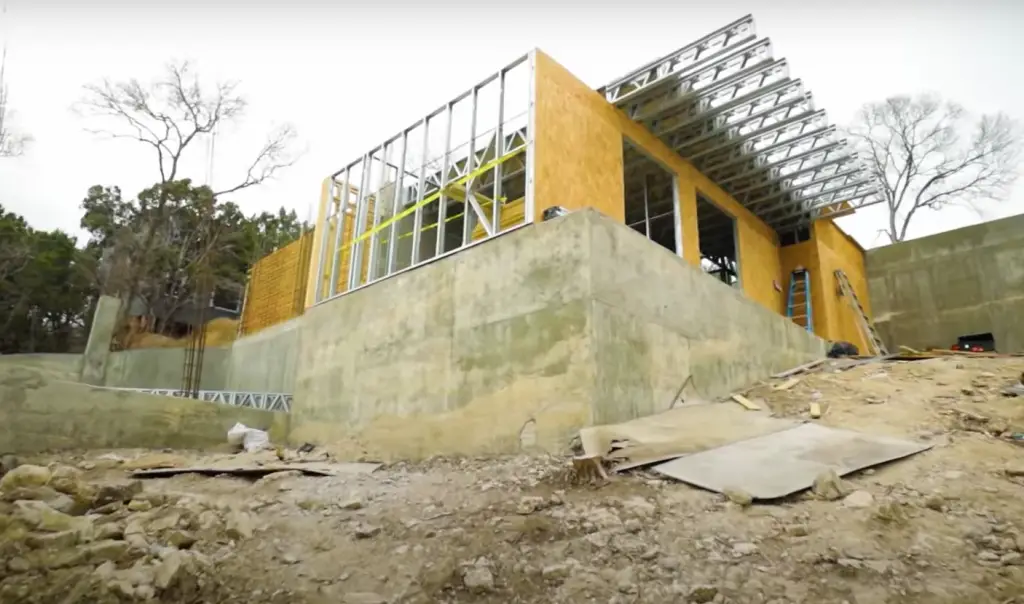
In contrast, metal studs are more susceptible to corrosion and rusting, especially if they’re exposed to moisture. As a result, they may only last for a few years before needing to be replaced.
Cons of Wooden Studs
Wood can warp and rot
Wood is an organic material, so it is prone to warping and rotting. This can be a serious problem if the wood studs are holding up your home’s structure.[2]
Wood is more expensive than steel
While the initial cost of steel may be higher, over time it will actually save you money. Steel studs don’t warp or rot, so they will last much longer than wood studs.[2]
Wooden studs can be difficult to install
Since wood is an organic material, it can be difficult to install. The irregularities in the wood can make it hard to get a level surface.[2]
FAQ
What is the best stud for framing?
This is a difficult question to answer definitively as there are pros and cons to both metal and wood framing studs. In general, metal studs are more fire resistant, stronger, and easier to work with than wood studs. However, they are also more expensive. Wood studs are less expensive but may require more maintenance over time. Ultimately, the best decision for your project will depend on your specific needs and budget.
Why are metal studs good?
Metal studs have many advantages over wood studs. They are stronger and more fire resistant, meaning they will provide a safer and more durable frame for your building. They are also easier to work with, making them a good choice for do-it-yourself projects. Metal studs are more expensive than wood studs, but they may be worth the investment if you need a strong and fire-resistant frame.
Do metal studs affect WIFI?
No, metal studs will not affect your WIFI signal. They may, however, affect radio frequencies (RF) that are used for some wireless technologies such as Bluetooth and cellular signals. If you are using these technologies in your home or office, you may want to avoid using metal studs in the construction.
Do professionals use metal studs?
Yes, professionals use metal studs for a variety of projects. They are commonly used in commercial construction because they are strong and fire resistant. Metal studs are also used in some residential construction, especially if the homeowner is looking for a durable frame that is easy to work with.
Why don’t they use metal studs in homes?
There are a few reasons why metal studs are not used more often in residential construction. One reason is that they are more expensive than wood studs. Another reason is that some people prefer the look of wooden frames, which can add a warm and natural element to a home. Ultimately, the decision of whether to use metal or wood studs in your home will depend on your needs and preferences.
Are metal studs better?
There is no definitive answer to this question as there are pros and cons to both metal and wood studs. In general, metal studs are stronger and more fire resistant than wood studs. They are also easier to work with, making them a good choice for do-it-yourself projects. However, metal studs are more expensive than wood studs. The best decision for your project will depend on your specific needs and budget.
Why are metal studs so flimsy?
Metal studs are not necessarily flimsy. They are, however, thinner than wood studs, which can make them seem flimsy in comparison. Metal studs are also less likely to warp or bend than wood studs, making them a good choice for framing projects that require straight lines.
Useful Video: Metal VS Wood Framing
Conclusion
There is no one-size-fits-all answer to the question of whether metal or wood studs are better. Ultimately, the best choice for your project will depend on a variety of factors, including the climate in which you live, the weight of the material you’re hanging, and your personal preferences.
If you’re looking for a durable, long-lasting option, metal studs may be the way to go. However, if you’re working on a budget or you prefer the look of wood, wooden studs can be a great option as well. Whichever route you decide to take, make sure you do your research and consult with a professional before getting started. With a little planning and effort, you can create a beautiful and functional space that you’ll be proud of for years to come.
If you have any questions about metal studs vs. wood studs, or if you need help choosing the right material for your project, contact the experts at MetalProfy today. We would be happy to answer any of your questions and help you get started on your next home improvement project. Thanks for reading!
References:
- https://www.thespruce.com/reasons-to-reconsider-steel-studs-1822847
- https://sebringdesignbuild.com/the-big-debate-metal-studs-vs-wood-studs/

